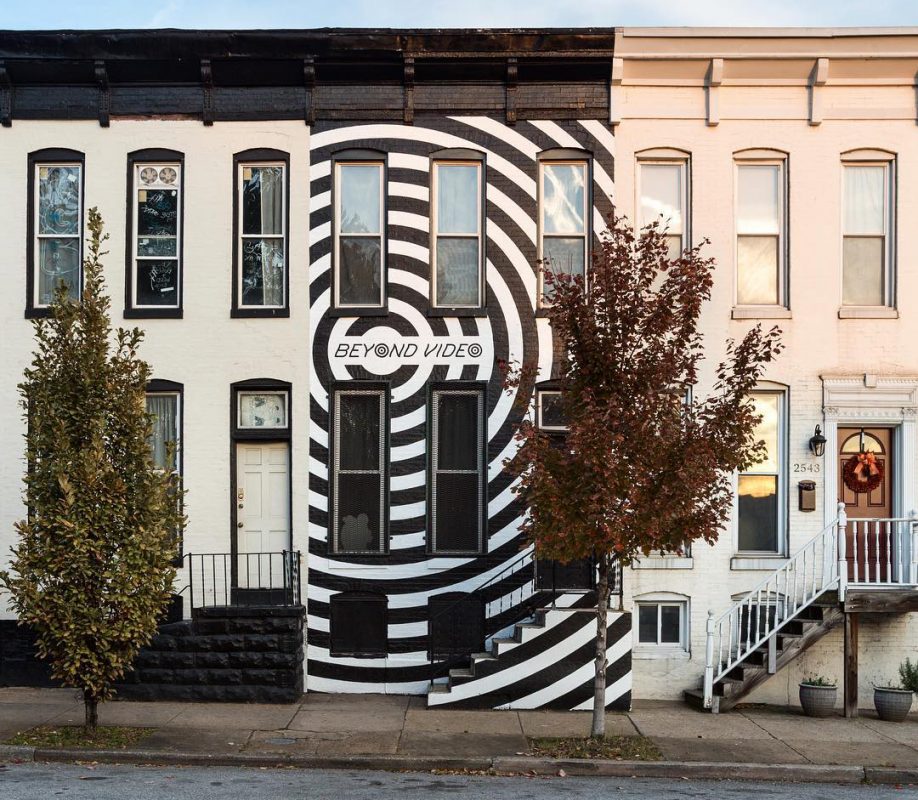
Those of us born before a certain year remember the idle pleasure of browsing your local video store, hoping the newest release wasn’t sold out, discovering hidden gems on the shelves, and buying sour candy at the register.
The passionate film lovers who make up Baltimore Video Collective certainly share those sentiments, too, considering they joined forces after beloved store Video Americain closed in 2014. After an impressive Kickstarter campaign, support from people like John Waters and Beach House, and collecting 10,000 titles from various sources, BVC is ready to open its new nonprofit video rental store Beyond Video.
Located on Howard Street in Remington, Beyond Video is using the modern streaming service model and applying it to its collection of vintage and rare VHS tapes, Blu-rays, and DVDs—ranging from rom-coms to campy horror to cult classics. The store’s founders include Joe Tropea, Liz Donadio, Scott Braid, Dave Barresi, Greg Golinski, Albert Birney, Kevin Coelho, and Eric Hatch.
As they prepare to open their doors on Friday, we spoke with Hatch (formerly director of programming at the Maryland Film Festival) about his love of movies, the origins of the project, and what makes this all oh-so-Baltimore.
Where did your love of film first begin?
Ironically, I grew up without a TV in the house, but my dad was, and still is, a big fan of old Hollywood movies—Marx Brothers, Humphrey Bogart, that kind of stuff. I grew up in Columbia and he would take us up to the Senator, the Charles, and places in D.C. to see these old Hollywood movies. That sort of gave me the bug. In my late teens, he relented and we got a TV/VCR, but strictly so we could watch old movies.
How did that passion translate into the opening of a nonprofit video rental store in Remington?
Well, it’s really a collective of us. A group coalesced one by one as Video Americain started closing. Initially it was to see if we could literally keep the store open, but that wasn’t viable. So we kept meeting over the years, looking primarily for a sympathetic landlord who would let us open another space. This nonprofit video store started forming in our mind. Things took a turn for the better almost two years at this point when we were able to start renting this space on Howard Street.
I know you got a lot of support from the local community. What was it like to see that outpouring?
It was very heartening to see the response on Kickstarter. Our goal was $30,000 and we ended up exceeding it. Looking back, I think that just the right amount of time had passed after Video Americain had closed. It wasn’t just nostalgia, it was a palpable loss. The hardcore cinephiles who were looking for foreign, documentary, and experimental things, they weren’t finding what they wanted online. They realized they had a broader spectrum at the video store. And maybe they realized that they missed talking to the people that work there. Sometimes algorithms on Netflix are great, but they don’t compare to the real world.
Do you think the younger generation understands the appeal of a brick-and-mortar video store?
Honestly, it isn’t taking a lot of work to show a new generation this world. We’ve done a low-key, invite-only opening the last few weeks to make sure we remember how to run a video store. There’s a wide sector of people coming in. The overwhelming majority are either people old enough to remember video stores and younger people who’ve never been. I think that’s actually how culture works. I grew up in the 1980s, so I had a fascination with the ’60s and ’70s. Kids that grew up in the ’90s or 2000s, they’re fascinated with the generation right before them. It’s a window into something they couldn’t have experienced before.
Talk about the unique model of Beyond Video.
The payment system is similar to a streaming service. You set up a recurring donation and you pick one of two plans: $12 a month that gives you three items at a time or $20 where multiple people can have have six items at a time. Once you’ve set up that recurring donation, there are no rental fees or no late fees whatsoever unless you’ve smashed one of our DVDs [laughs]. You hear about projects like this from around the country, but mostly it’s venerable institutions the have shifted to nonprofit status. All of them were pre-existing stores and they use the old business model of pay-as-you-go. The fact we’re building it from scratch and have 10,000 titles is unique.
How did you build out your collection?
The initial period we were accepting donations and we had a social media presence. We would take any commercially issued tape, DVD, or Blu-ray. And then, as things got a bit more serious, we did the work of laying out the collection, scanning everything in and seeing what we had and didn’t have. It was sort of this mental game of identifying where the holes in the collection were. That was actually super fun. We created a shared Google Doc and people started sending items we were missing from that list. Even though there’s something old-school about a video store, we’re using all the best aspects of the internet like social media and crowdsourcing to make this happen. I got a great response from A24, Criterion, and other distributors, who gave us freebies or big discounts. They loved the video store era, too.
Any titles you’re especially excited about?
I myself donated from my collection a copy of my favorite movie Posession, a 1981 very over-the-top arthouse horror movie that is only available in a super expensive velvet box. We’ve also had a lot of people donate a ton of out-of-print titles. But we want to be a full-service store. We have two floors in our store, upstairs there’s one room organized by director and then there’s another that’s comedy, drama, horror, and romance and those are very well-stocked with a lot of recognizable films.
What’s in store for this weekend?
Friday is going to be our first day open to the public. We’re open just on weekends through December and going to scale up in January and February. We’re hoping eventually to be open four or five days a week. On Friday, no balloons or popcorn I don’t think, we’re just opening the doors to the general public for the first time. I’m sure this type of thing could happen in other cities, but this has had a very DIY spirit that reflects the Baltimore sensibility.
